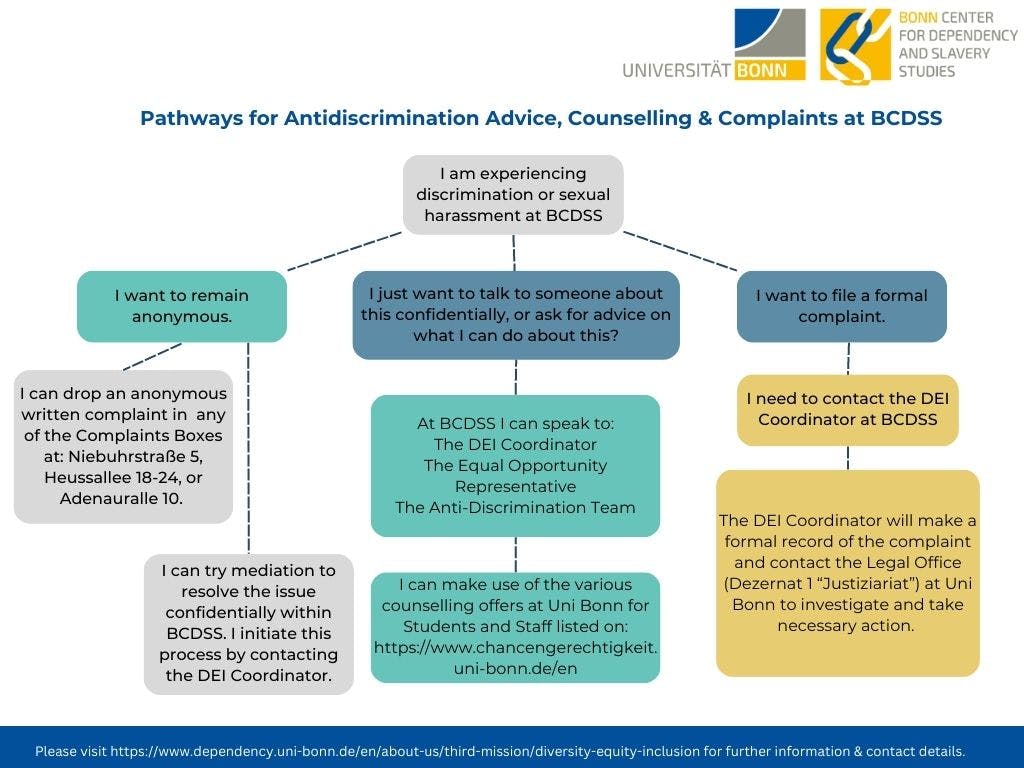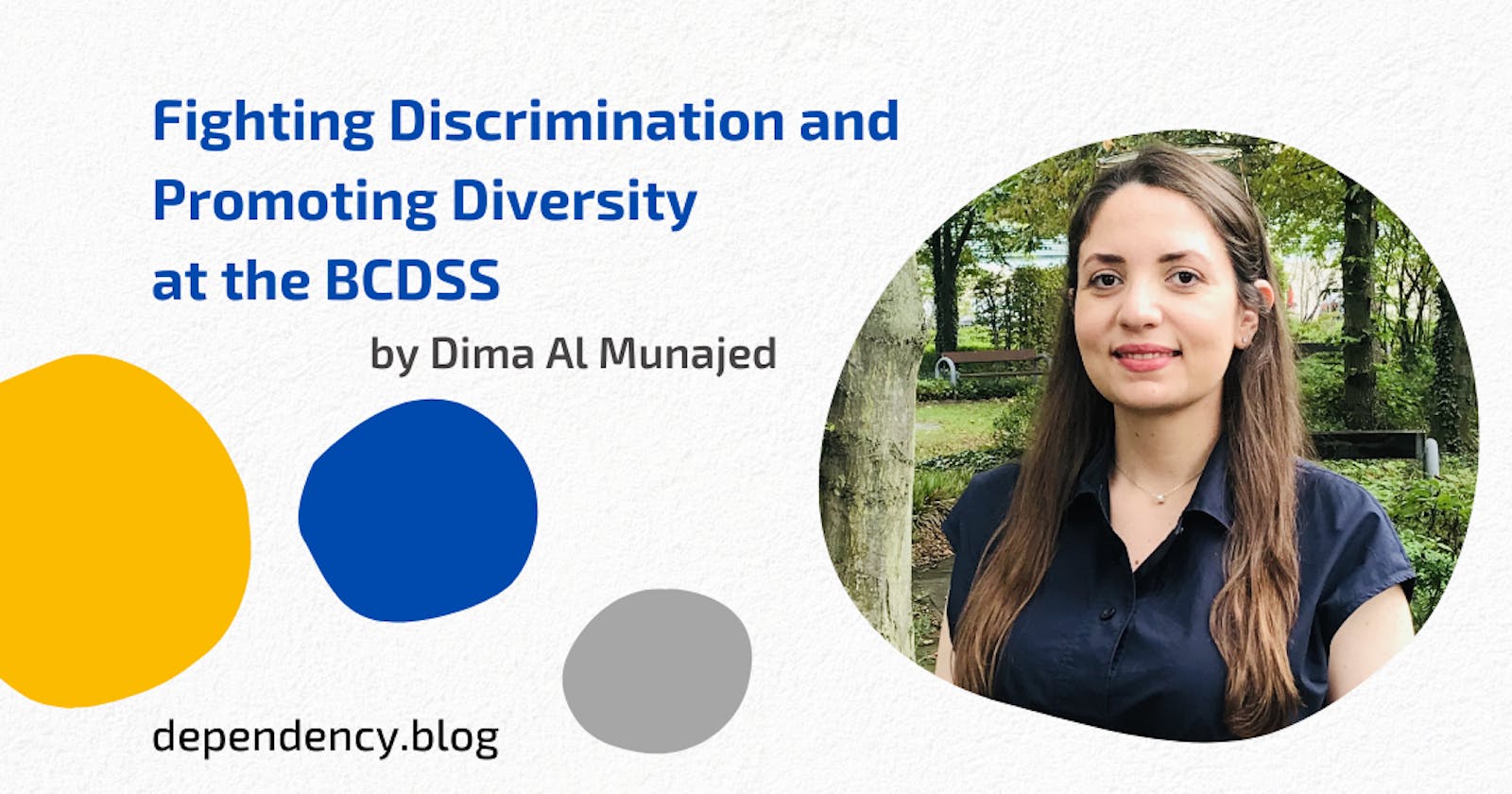The BCDSS takes pride in being an international institution that welcomes students and researchers from all over the world. The diversity of its members, regarding language, gender, sexual orientation, religion, age, and health, along with both social and cultural background, is considered one of our prized assets and a driver of academic excellence.

29 Countries are Represented in BCDSS’s membership, and 57% of our team comes from outside Germany (Graphic from BCDSS/Meltem Dramali)
Perhaps the majority of academic institutions in the Western world today are working to promote academic diversity in one form or another. Whether by supporting women in science, or working to include more members from minority groups that are underrepresented within the higher academic ranks, academia today increasingly acknowledges that science that incorporates the perspectives and experiences of diverse groups is better science.
In recent years, the University of Bonn has taken several steps to promote diversity among its students, researchers, and teaching staff. Shaped by the requirements of the German General Equal Treatment Act, some of these steps include reviewing admission policies regarding German language proficiency and university entrance qualifications; they also involve supporting individuals with familial responsibilities.
A major priority of the University of Bonn's diversity, equity, and inclusion work has been to significantly increase the number of female professors and researchers within its ranks.
A 2020 survey reported that 22% of all professorships at the University of Bonn were held by people who identify as female. Although still far from reaching gender equality, this figure is almost double the 11.5% that existed in 2012. As part of the University of Bonn, the BCDSS actively works to recruit a minimum of 50% female researchers and staff across organizational levels. To date, an estimated 63,5% of BCDSS members are females.
The possibility of being part of this growing academic diversity and working to expand it further is what motivated me to join the Cluster last February as its new Diversity, Equity and Inclusion Coordinator. So far this year, the BCDSS has taken various steps to promote diversity and ensure that the Cluster is a learning and research environment where all members feel respected, heard, and protected from any form of discrimination or harassment.
In the rest of this blog, I will focus on three of the steps taken by the BCDSS to combat discrimination and harassment, namely the development of an Antidiscrimination Policy, which our Steering Committee passed in June of this year, the establishment of an Antidiscrimination Team, and the re-launch of our Diversity, Equity and Inclusion (DEI) web page.
The new BCDSS Antidiscrimination Policy was drafted in response to the need for greater clarity in defining discrimination and sexual harassment and outlining clear courses of action when such events occur. The policy defines discrimination as follows:
We define discrimination at BCDSS as the unequal treatment of individuals, their subjection to acts of conscious or unconscious degradation, bias, violence, bullying, or explicit and implicit exclusion from work, learning opportunities, or decision-making and feedback processes based on an unjust distinction deriving from one or intersections among (multiple-discrimination) the following individual characteristics listed in the Charta der Vielfalt which include: age, ethnicity/nationality, race, gender, religion, physical and mental ability, sexual orientation, social background, or any other relevant social categorisation that forms the basis for these discriminatory acts.
In its coverage of acts of sexual harassment, the policy also refers to the University of Bonn’s Guidelines for Protection Against Sexualized Discrimination and Violence, which were published on February 15, 2023. The guidelines are available in both German and English on the University of Bonn’s website.
The BCDSS’s new Antidiscrimination Policy is designed as a tool that Cluster members can use to ensure a safe and respectful environment. Far from serving as a rigid list of requirements and prohibitions, it is intended to be a living document that sets out core principles and outlines how those principles can be applied in diverse circumstances.
Sometimes, adherence to policy requirements can feel rigid and uncaring. Yet, when these policies are absent or ignored, it is impossible to ensure due process and places those who have suffered discrimination or harassment at greater risk.
That is why it is so crucial for those responsible for DEI in the academe and beyond to utilize every available avenue of communication to get the word out about the protections available to employees, students, and organization members. It is equally important that members themselves use our policies and procedures if they experience discrimination.
Consequently, Section IV of the BCDSS Antidiscrimination policy "Getting Support & Acting Against Discrimination," outlines various forms of support and procedural responses available to those affected by discrimination. These procedures include informal processes (such as being able to seek advice, counseling, or mediation) and formal procedures that entail filing formal complaints with the support of the University of Bonn. Depending on the severity of the alleged offense, issuing a formal complaint may result in an investigation of allegations and disciplinary measures taken against violators.
The following figure summarises the available courses of action:

In recent months, we have also created a new entity to make anti-discrimination support more accessible throughout the Cluster. For large academic institutions like the BCDSS, where members are spread out across various locations, it makes sense to have anti-discrimination support that is available from multiple perspectives and throughout those locations rather than in a centralized space.
Our new Antidiscrimination Team is a voluntary group of BCDSS members that act as initial points of contact for BCDSS members experiencing any form of discrimination.
The new team will receive basic training in managing concerns based on diversity, equity, and inclusion and can offer colleagues confidential counseling and preliminary guidance on how to proceed with complaints. The Diversity, Equity, and Inclusion Coordinator and the Equal Opportunity Representative are also members of the Anti-discrimination Team, which ensures prompt communication when concerns are expressed.
Having an Antidiscrimination Team with members that are diverse not only in terms of function (staff, academics, and students) but also in age, ethnicity/nationality, race, gender, religion, physical and mental ability, sexual orientation, social background is an invaluable asset when working to fight discrimination in academia.
Just as diversity enriches academic research by bringing in different perspectives, the more diverse an antidiscrimination team is, the more likely it is to do a better job at identifying discrimination (especially in its unconscious or implicit forms). Diverse teams can also be better-equipped to offer solutions that reflect the needs of the individual or group against which the discrimination was directed.
Furthermore, exposure to discrimination or harassment can be a very painful experience that is difficult to share. Genuine empathy from the listener is essential, so for people experiencing discrimination, having a diverse Anti-discrimination Team increases the probability that the person facing discrimination can find people with whom they identify and share their experiences.
To make information related to diversity and anti-discrimination policies more accessible to everyone, the former "Equal Opportunities and Diversity" page on the BCDSS website has been redesigned and renamed the ‘Diversity, Equity and Inclusion (DEI)’ page. The full English version of the BCDSS Anti-discrimination policy is available on the website as a downloadable PDF. We are currently working on a German translation and hope to make it available online in the coming weeks. The page also contains the names and contact information of all persons who are officially involved in Diversity, Equity and Inclusion efforts at the Cluster. They can be found on the ‘DEI Team’ page
Fighting discrimination and promoting diversity is a collective effort. Everyone at the Cluster shares responsibility for making themselves aware of our new policy’s contents and adhering to its behavioral guidelines.
Whether you are a member of the BCDSS or not, embracing diversity in academia, the workplace, or anywhere else, for that matter, is part of embracing the realities of the world in which we live and the challenges that we have to face collectively as a human race.
Centers like the BCDSS that are part of the Excellence Initiative, and are intentionally intercultural, international, and interdisciplinary, represent unique sites that provide remarkable opportunities to work and learn together. Moreover, they can serve as creative spaces of intercultural exchange where respectful interaction among diverse groups and individuals can lead to the development of more inclusive policies and practices.
In the coming years, I hope we will take advantage of this opportunity and that the BCDSS will be a key contributor in the fight to promote diversity and counter discrimination in German academia.

